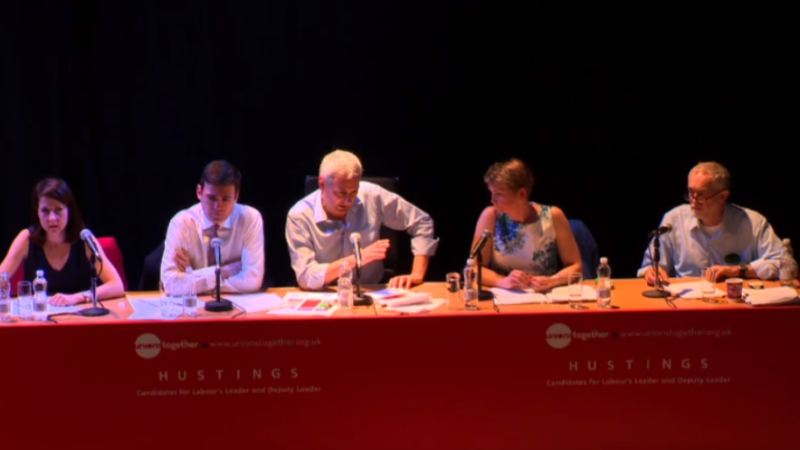
The four Labour leadership candidates today took part in a mammoth two and a half hour hustings, organised by Unions Together in a hot Camden Town Hall. Here’s a quick run-down of what happened:
Jeremy Corbyn
Corbyn said that the last Labour Government “allowed business ethics to take over” too much of their approach to power – which is what led to the “millstone of PFI”. He said that no one should be without food or a home and stressed that the need for the “labour movement and trade union movement to become a social movement” – that’s becoming a recurring slogan of his.
He also spoke of the need to “organise internationally” to fight for “justice, peace, human rights and equality”. In his closing statement made an argument for anti-union laws to be repealed and for the importance of collective bargaining.
Interestingly, he also recognised that “these are difficult times and difficult decisions need to be made” – but did not expand on this thought.
How much is... basic state pension? His answer: “£70.” Real answer: £115.95
Yvette Cooper
Cooper attacked the “Tory myth” that “too many teachers, too many doctors that caused the Lehmann Brothers to crash” in 2008. She contested that Labour should be clearer on speaking out against that version of events.
She spoke of the importance of winning back voters from UKIP (but “not by aping them”), a pledged to “fight” and later “reverse” the Tories’ proposed new strike laws. She also promised a new law to make exploitation of migrant workers a crime.
When the leadership candidates were asked if they would attend an ASLEF tube station picket line next week, Cooper replied that she wouldn’t (unlike Corbyn) and explained that she believes political and industrial struggles are separate.
How much is… Jobseekers Allowance for over 25s? Her answer: “£80.” Real answer: £73.10
Andy Burnham
Burnham began his opening statement with praise for Ed Miliband, saying that his leader should not be disowned (pointedly adding “as some have suggested”) but instead Labour needs to “build on that”.
The party lost “people have lost their emotional connection with Labour” – partly because of the practice of “parachuting people with those posher accents into safe seats and putting them straight into the Cabinet”. He also attacked the last Labour Government for allowing “the market too far into the health service”.
He said he “will never cave in to a Tory agenda” and warned about looking like part of the “cozy Westminster elite” during the coming EU referendum. He promised to fight Cameron’s “demonisation of trade unions” and said “I agree with Jeremy [Corbyn] that union money is the cleanest in politics”.
However, he ruled out adopting a “‘no cuts’ line” and said that “we did let the deficit get too high”.
How much is… Child Benefit for first child? His answer: “£20.70.” Real answer: £20.70
Kendall maintains that Labour lost because “people did not trust us on the economy or taxes” and said that she does not believe in the “false choice between standing up for workers and standing up for businesses”.
She spoke in favour of worker representation on company boards and the need to increase the number of private sector workers who are members of trade unions – pointing out that only 14% currently are. She aspires to make the National Minimum Wage a living wage (using ideas she set out last week on LabourList) and said that on education, concentrating on early years is a “priority” for tackling inequality.
Kendall told the audience that she “won’t always say what’s comfortable for our party, but I will always say what I believe is right”. She added that a problem for Labour has been appearing to be ‘against’ people rather than ‘for’ them: “We will not help the weak and vulnerable simply by railing against the strong”.
How much is… income where top rate of tax starts? Her answer: “£42,000.” Real answer: £42,385



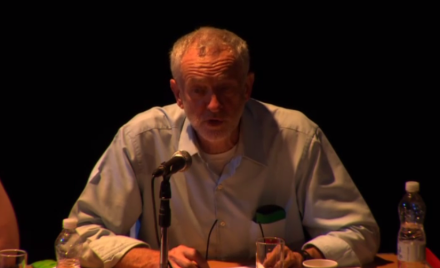
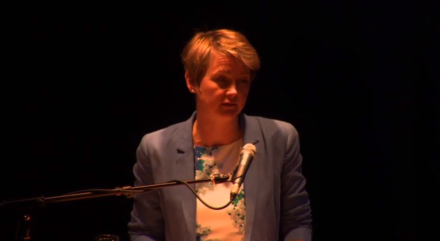
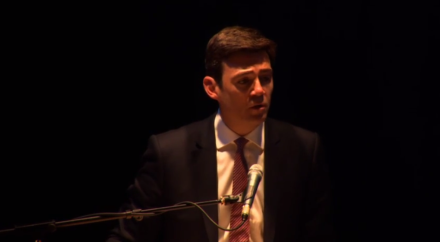
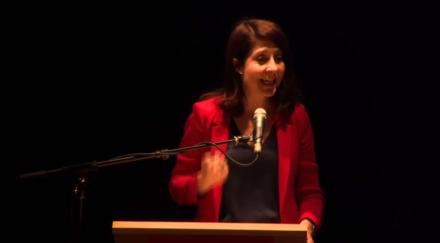

More from LabourList
‘Unity or division’: Starmer’s message to voters in Gorton and Denton
Almost half of Labour members oppose plans to restrict jury trials, poll finds
‘How Labour can finally fix Britain’s 5G problem’